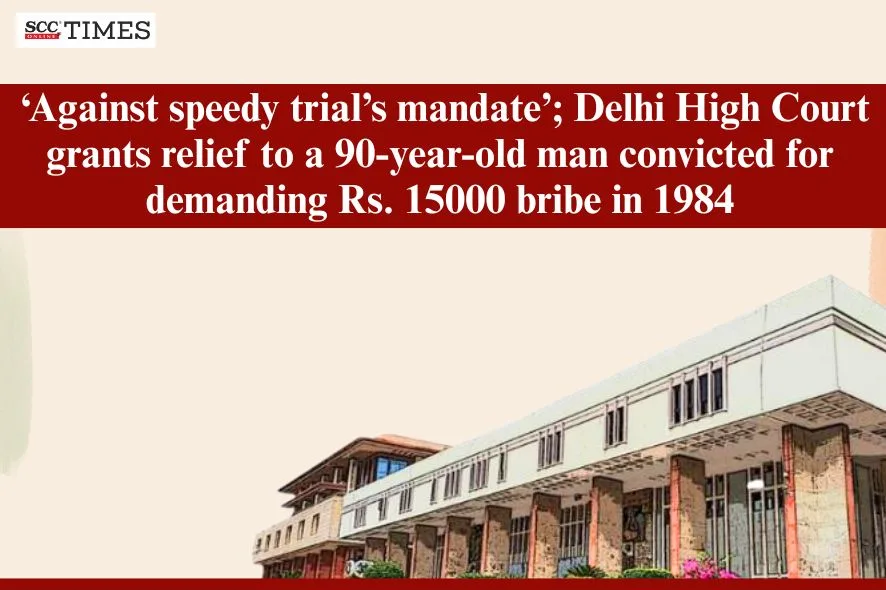Delhi High Court: In an appeal filed by the 90-year-old appellant, challenging his conviction under Sections 5(1) read with 5(2) of the Prevention of Corruption Act, 1947 (‘PC Act’) and Section 161 of the Penal Code, 1860 (‘IPC’), whereby he was convicted for demanding Rs. 15k bribe in 1984, a Single Judge Bench of Jasmeet Singh, J., stated that such inordinate delay was plainly at odds with the constitutional mandate of a speedy trial envisaged under Article 21 of the Constitution. Thus, considering mitigating circumstances, the Court reduced the appellant’s quantum of sentence to the time already served.
Background
The appellant was employed as the Chief Marketing Manager of the State Trading Corporation of India (STC). In 1983, STC issued an invitation for quotations from suppliers for the supply of 140 tonnes of dried fish to STC. In which response, a firm based in Bombay, submitted its quotation through the complainant.
On 3-1-1984, the complainant, visited the appellant’s office after finding out that the order for the supply of dried fish had been placed with other suppliers despite offering the same price. During this meeting, the appellant assured to make the order but demanded a bribe of Rs. 15000 in return. Thereafter, the complainant reported the demand of bribe to the CBI. Subsequently, a raiding team was constituted, and the appellant was arrested and found guilty of offence punishable under Section 5(1)(d) read with 5(2) of the PC Act and Section 161 of the IPC. Accordingly, the appellant was sentenced for a period of two years rigorous imprisonment and Rs. 7500 as fine.
Thus, being aggrieved with the aforesaid order of conviction, the appellant filed the present appeal seeking reduction of the sentence to the period already undergone, considering the advanced age, deteriorating health condition, and other mitigating circumstances.
Analysis, Law and Decision
The Court observed that in criminal jurisprudence, sentencing was not merely a mechanical exercise but involved a careful balancing of aggravating and mitigating factors. While aggravating circumstances highlight the gravity and impact of the offence, mitigating factors provided insight into the personal circumstances of the offender which might require a lesser punishment.
The Court relied upon the decision of Supreme Court in Mohammad Giasuddin v. State of Andhra Pradesh (1977) 3 SCC 287, and stated that the mitigating factors might include the age of the accused, absence of prior criminal record, mental or physical health conditions, socio-economic background, duration of trial, and good conduct during incarceration.
Referring to Pramod Kumar Mishra v. State of Uttar Pradesh 2023 SCC OnLine SC 1104, wherein the importance of considering mitigating factors while awarding sentence, particularly in cases involving long-pending prosecutions, was reiterated. The Court stated that the objective of sentencing must be a combination of deterrence and rehabilitation. Both must coexist and in the absence of one, the purpose of the other could not be achieved.
The Court stated that the list of mitigating factors was only illustrative and not exhaustive. No hard and fast formula or mechanism for combining deterrence with rehabilitation could be laid down, but the same must be worked out on individual and case to case basis.
The Court observed that in the present case, the incident took place on 4-1-1984, and since then the proceedings were continuing for over four decades, with the trial itself taking nearly 19 years to conclude, and the present appeal remaining pending for more than 22 years. Such inordinate delay was plainly at odds with the constitutional mandate of a speedy trial envisaged under Article 21 of the Constitution.
The Court further stated that the ‘Sword of Damocles’ and uncertainty qua the fate of the case of the appellant have been uncertain for a period of nearly 40 years and that by itself was a mitigating factor. Further, a vital mitigating factor in considering the sentence was the appellant’s advanced age. At 90 years of age, the appellant was suffering from serious health ailments and highly vulnerable to the physical and psychological impact of incarceration. Any such imprisonment would risk causing irreversible harm and would defeat the very objective of mitigating the sentence.
The Court stated that the appellant was a senior officer with STC and had already suffered incarceration for one day. The appellant had not challenged his conviction and the fact he was guilty of offences would remain with him for his entire life. The appellant had duly prosecuted his appeal till today i.e. for more than 40 years there had been no other FIR or criminal case of any kind registered against him.
The Court stated the present case was the fit case for reducing the quantum of sentence of the appellant considering the mitigating circumstances. Thus, the Court reduced the appellant’s sentence to the time already served.
[Surendra Kumar v. CBI, 2025 SCC OnLine Del 4788, decided on 08-7-2025]
*Judgment authored by: Justice Jasmeet Singh
Advocates who appeared in this case :
For the Appellant: Shri Singh, Sowjhanya, Shankaran, Advocates.
For the Respondent: Atul Guleria , Aryan Rakesh and Prashant Upadhyay, Advocates.




